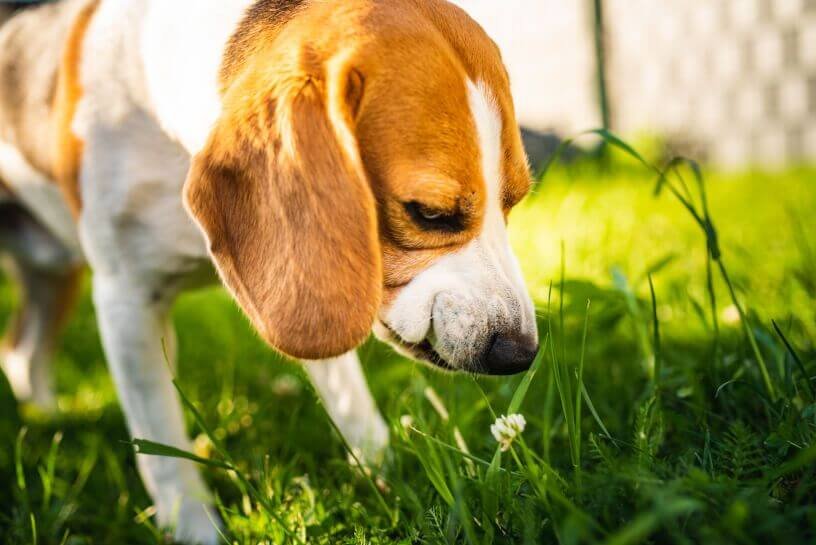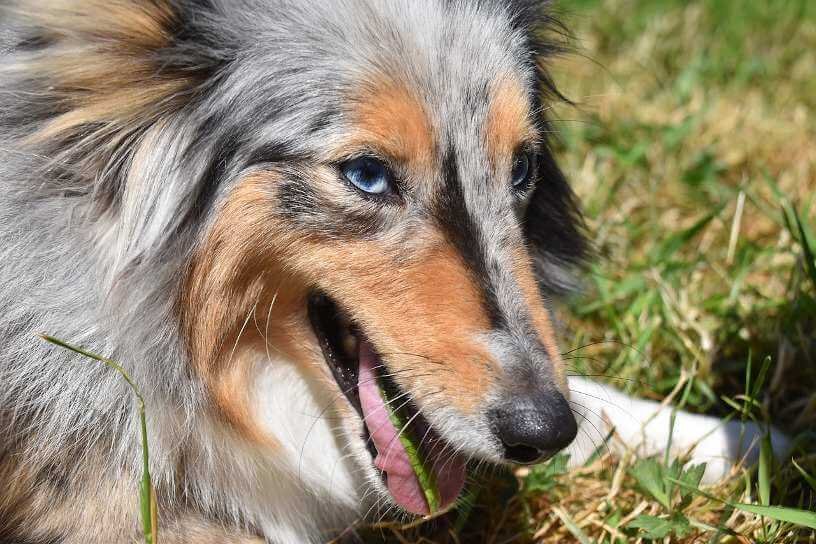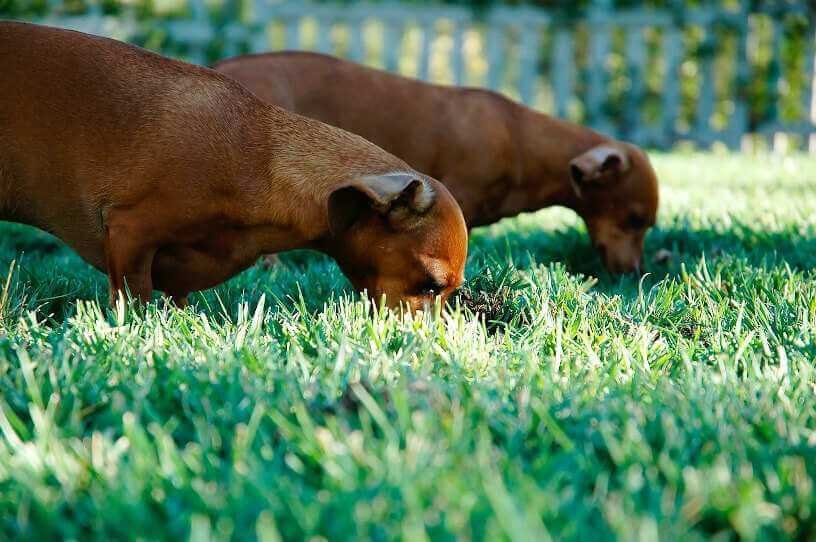Table of Contents
ToggleHave you ever asked yourself where your dog’s irresistible urge to nibble on grass comes from? Is it an ingrained habit, is it your dog’s way of saying “I want more greens in my diet”, or is it something more? Well, unlike your lawn clippings, the answer to the question “Why do dogs eat grass?” is not as cut-and-dry.
Read below to learn more about this rather peculiar canine phenomenon.
6 Reasons Why Dogs Eat Grass
According to a recent study, 79% of dogs exposed to grass will at some point start grazing on it. There are several theories explaining why dogs eat grass. However, none of them is better than the rest. Perhaps, the truth lies somewhere in the blurry cross-section of all of these theories:
- Eating grass is an ingrained habit. According to a theory, even obligate carnivores are instinctively attracted to chlorophyll-rich plants. Prior to domestication, wild dogs hunted small, grass-eating animals such as birds, rodents and reptiles. When eating them, through the content of the prey’s digestive tract, wild dogs would receive a certain amount of green nutrients.
- Eating grass may help fight off intestinal worms (however, grass can also carry worm eggs that pets ingest). One theory is that instead of using de-wormers, wild canine ancestors ate grass and other plants to prevent build-up of intestinal worms. Grass is useful when it comes to fighting off worms because of two reasons:
- Undigested grass blades can physically wrap themselves around the worms and carry them out through the faeces.
- The natural chemicals in the grass promote better intestinal motility which helps eliminate intestinal worms.
- Eating grass can be a symptom of eating nutritionally deficient commercial dog foods. No matter what the label displays, commercially available, processed dog foods often lack necessary greens. If constantly fed such formulas, dogs start lacking dietary fibre and certain enzymes. Eating fresh grass is a good way of compensating for the deficiency.
- Eating grass induces vomiting. Instead of chewing the grass, some dogs prefer gulping down whole mouthfuls of grass. Then, the intact grass blades tickle the throat and the stomach lining thus inducing vomiting. According to this theory, when eating grass dogs are actually self-medicating – they are trying to get their stomachs rid of something that was not supposed to be there in the first place.
- Eating grass is a good entertainment when bored. Just like we can devour a whole family-sized bag of chips, dogs can graze grass out of pure and simple boredom.
- Eating grass is fun and tasty. Dogs are in fact very simple creatures with not so picky eating preferences. Most dogs find grass to be not just tasty but also pleasant to eat. Plus, for dogs with garden access, the grass is a readily available food source.
Puppy eating grass
Studies suggest that puppies are more likely to eat grass than adult dogs. There are several theories explaining this phenomenon. First of all, because of their underdeveloped immune systems, puppies are more prone to intestinal parasites. Therefore, eating grass is a defence mechanism. The second theory takes into consideration the teething situation. Namely, when chewing grass the grass blades tickle the sore gums and offer some level of pain alleviation. Last but not least, puppies are mischievous and eating grass can be part of their usual shenanigans.
Dogs eating grass frantically
Munching on grass, every now and then, is nothing to be worried about. However, if the occasional grass munching turns into grass obsession there might be an underlying issue. In such situation, the next best step would be booking a vet check up for your pet. Best case scenario, your dog is just bored and needs more stimulation. Worst case scenario, there is an underlying medical issue that you can detect and fix early.
How to stop your dog from eating grass
If the grass eating habit turns into a compulsive behaviour it is time to take action and curb this problem. You can prevent your dog from eating grass by:
- Offering dry and fibre-rich fruits and vegetables as treats – why chew on grass when there is something tastier and with a more pleasant texture!
- Using redirecting techniques – as in most compulsive behaviours, keeping your dog both physically and mentally stimulated is likely to redirect it from the unwanted behaviour (in this case – eating grass). Provide treat dispensing toys is one example.
Pet grass for dogs to eat
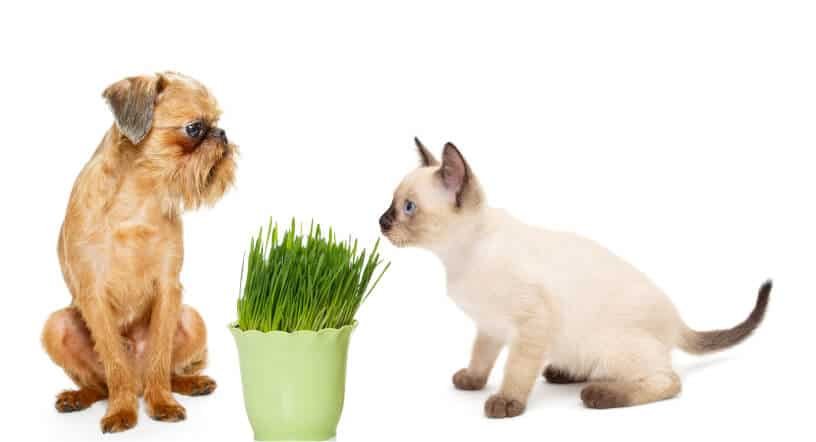
Our modern market offers pet friendly grasses for dogs. Most of them are in fact wheatgrass. Wheatgrass are the freshly-sprouted, gluten-free leaves of the wheat plant. In addition to wheatgrass, some pet-friendly grass options for dogs include wild oat, rye and barley.
Adding pet-friendly grass to your dog’s diet is a smart and simple way of deterring your pet’s appetite from harmful and potentially toxic household plants and chemically-treated outside grasses.
Other things your pet may like to eat
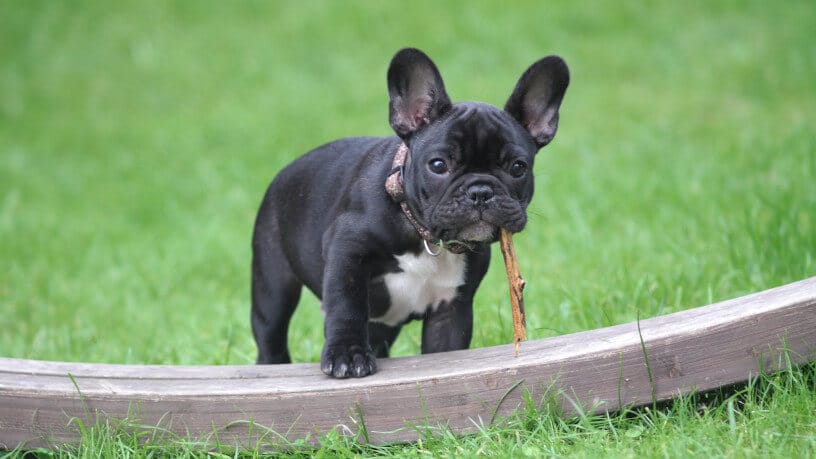
Your pet’s gastronomic delights may not be just limited to grass. Some pets like to eat poop, soil, sticks, compost and even their own vomit. Usually the underlying cause is similar to those outlined above for why do dogs eat grass. We will discuss these additional behaviours in depth in future articles.
If there is anything else you would like us to discuss, or your pet has a strange eating habit, be sure to leave a comment down below and let us know.
FAQ
Most frequent questions and answers about dogs eating grass.
Since both wild and domestic dogs are known to eat grass (and even benefit from it), most vets consider eating grass a normal canine behaviour.
As long as your dog eats moderately, it is alright to let them indulge their grass cravings. However, if they do so frequently or feels sick afterwards, it is advisable to seek veterinary attention.
Freshly mowed grass clippings are equally appealing (from a dog’s point of view) as regular grass.
When it comes to taste preferences, dogs are not very picky eaters. In fact, they would eat anything they can get their teeth on (and that includes leaves, bark, plants and grass).
Yes. Eating too much grass (even if pet-friendly) can cause gastrointestinal upset followed by vomiting, diarrhoea, lack of appetite and dehydration.
It may have something to do with the grass blades tickling the stomach lining. However, only 22% of the dogs eating grass will vomit after doing so.
This question is difficult to answer as only 9% of dogs feel sick before actually eating grass.
Terriers and other dog breeds prone to digging are likely to eat grass roots together with the grass itself.
No. If the grass was treated with chemicals or contains worm eggs, the potential danger is the same, regardless of whether your dog licks or eats.
Yes. However, if a dog that did not eat grass suddenly starts eating grass during pregnancy, it is time to make an appointment at your trusted vet’s office.
The grass itself is not poisonous to dogs. However, the chemicals (pesticides, insecticides, fertilizers) used to treat grass can be poisonous. Another problem is the presence of weeds, since certain types of weeds are poisonous to dogs. Last but not least, more often than not, toxic mushrooms can grow hidden in the grass.
Certain types of weed (such as the Bishop’s weed) are poisonous to dogs and ingesting them requires immediate veterinary attention.
Yes. Certain types of intestinal worms or their eggs live in the grass and if ingested (together with the grass) can cause worm infestations in pets. Examples include Roundworm and Hookworm.

